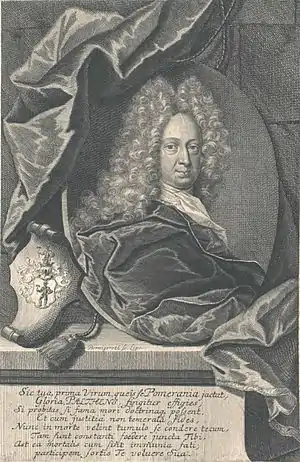Johann Philipp Palthen | |
|---|---|
 Johann Philipp Palthen | |
| Born | 26 June 1672 |
| Died | 26 May 1710 (aged 37) |
| Alma mater | University of Greifswald |
| Occupations |
|
| Parent(s) | Johann Palthen Dorothea Hoppe |
Johann Philipp Palthen (26 June 1672 – 26 May 1710) was a Western Pomeranian historian and philologist. [1]
Life
Palthen was born in Wolgast, a port in what was then Swedish Pomerania. His father was Johann Palthen, a senior official at the court, and his mother, born Dorothea Hoppe, also came from one of the town's leading families. The boy attended the Gymnasium (school) in Greifswald, moving on to Greifswald University where he studied between 1688 and 1691.[1]
He was able to attract influential patrons from early on in his career, and after his graduation he obtained a post with Johann Friedrich Mayer, as a tutor and librarian, based in Hamburg.[2] Palthen was also able to accompany Mayer during an extensive tour that took in the Netherlands, Denmark and the Swedish mainland.[1] Another patron was Samuel von Pufendorf whose wife was related to the Palthens. It was through the intervention of von Putendorf that in 1694 Nils Bielke, the Swedish governor general, appointed Johann Philipp Palthen, still aged only 22, as Professor of Mathematics and Morality at the University of Greifswald.[1]
More travel came in 1697 and 1698 when Palthen accompanied Bielke's sons on a visit to France and England. In Paris he studied the works of Jean Mabillon, Étienne Baluze, Jean Hardouin, Louis Du Four and Pierre Daniel Huet, and was able to meet some of these. It seems likely that it was Du Four that stimulated his interest in Tatian which he was then able to pursue further in Oxford.[1]
Palthen returned to Greifswald in 1699, taking a professorship in History. He had been in regular correspondence with his patron Johann Friedrich Mayer since 1694, and in 1701 Mayer was appointed General Superintendent for Swedish Pomerania and full professor in Theology at Greifswald, after which Palthen was able to use the Theology faculty's extensive library for his studies. Together with Mayer he set about organising the launch of a new "Learned Society in 1704", but the project came to nothing due to factionalism at the university between advocates of Pietism and adherents of Lutheran orthodoxy. In 1708 Johann Philipp Palthen served as Rector of the university.[3]
During his stay at Oxford, in 1698, Palthen got hold of a copy of Tatian's Gospel harmony, based on a manuscript of an Old High German translation attributed to Franciscus Junius. He managed to obtain financial backing from Magnus Lagerström (effectively the Swedish viceroy in Swedish Pommerania) to have the work printed at Greifswald in 1706.[4] As well as his lectures, Palthen devoted his scholarly endeavours at Greifswald to German history, Natural and State Law and the work of Hugo Grotius.[1] He also devoted time and meticulous care to the collection and archiving of numerous "Res Gestae" and other source documents which, because of his work three centuries ago, survive today in archival collections in Greifswald, Stralsund and Putbus.[1]
References
- 1 2 3 4 5 6 7 Theodor Pyl [in German] (1887). "Palthen, Johann Philipp". Palthen: Johann Philipp P., Historiker und Sprachforscher, aus einer alten von der Wetterau nach Mecklenburg und Pommern eingewanderten Gelehrtenfamilie, welche sich im geistlichen und Lehrfache, sowie in der Verwaltung auszeichnete, war ... Allgemeine Deutsche Biographie. Vol. 25. Duncker & Humblot (originally) & Historischen Kommission bei der Bayerischen Akademie der Wissenschaften (online version). pp. 111–112.
- ↑ F. L. Hoffmann: Hamburgische Bibliophilen, Bibliographen und Litteraturhistorisker. In: Robert Naumann: Serapeum. T.O. Weigel, Leipzig 1865, p. 226.
- ↑ "Die Rektoren der Universität, 1700-1799". Prof. Dr. Johanna Eleonore Weber iA Ernst-Moritz-Arndt-Universität Greifswald. Archived from the original on 8 December 2015. Retrieved 27 November 2015.
- ↑ Tatiani Alexandrini (sic: although Tatian the Assyrian himself wrote that he came from "the land of the Assyrians", there are several sources supporting the belief that for some time he lived in Alexandria; Franz Junius (translator into Old High German) [in German]; Johann Philipp Palthen (frequently identified on retailers' web pages as the author, but actually notable here as the man who in 1706 arranged for the production of the first printed version in 1706) (1993). Tatiani Alexandrini Harmoniae Evangelicae Antiquissima Versio Theotisca. Anscheinend durch Du Fours Studien über Tatian angeregt, nahm er während seines Aufenthaltes in Oxford (1698), nach dem Manuscript des Franziscus Junius, eine Abschrift von der althochdeutschen Uebersetzung der Tatianischen Evangelienharmonie, welche er im J. 1706 in Greifswald im Druck herausgab. ISBN 978-9-051-83498-7.
{{cite book}}:|author2=has generic name (help);|work=ignored (help)CS1 maint: numeric names: authors list (link)